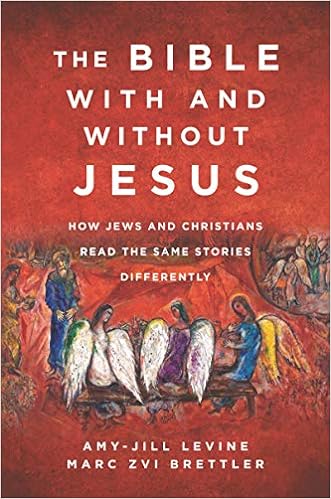|

book-cover art, Marc Chagall’s Abraham and the Three Angels (1966)
… the second-century BCE book of Daniel interprets the late seventh-and early sixth-century prophecies of Jeremiah. The book of Daniel, although containing earlier material, is, in its final form, a response to the outrages of the Syrian Greek king Antiochus IV Epiphanes, whose defeat is commemorated in the Jewish festival of Hanukkah. Antiochus forbade central Jewish practices, such as circumcision and Sabbath observance, and he and some highly assimilated Jewish priests converted the Jerusalem Temple into a temple for Zeus.
For other Jews, these actions contravened Jeremiah’s prediction that the Babylonian king Nebuchadnezzar would conquer Judea (which he did in 586 BCE) and rule over the Judeans for seventy (Hebrew shiv‘im) years (Jer 25:11). Then, Jeremiah predicted, there would be a grand restoration (Jer 29:10–14). Antiochus was not a grand restorer but a tyrant.
Enter the book of Daniel. (Like many biblical books, the book of Daniel was not written by the sage to whom it is attributed.) When Daniel prays for guidance on this contradiction between ancient prophecy and current reality (Dan 9:2), the angel Gabriel (named angels, both Gabriel and Michael, appear in the Tanakh only in Daniel—one indication of the book’s late date) explains that seventy years is not actually seventy years:
“Seventy weeks [Hebrew shavu‘im shiv‘im] are decreed for your people and your holy city: to finish the transgression, to put an end to sin, and to atone for iniquity, to bring in everlasting righteousness, to seal both vision and prophet, and to anoint a most holy place” (Dan 9:24).
“Seventy weeks” of years means 70 times 7 (since a week has 7 days), or 490 years; thus Jeremiah’s prophecy gets a 420-year extension, from 70 years to 490 years, and so it can still be fulfilled.
This extension is based on a manipulation of Jeremiah’s words. The Hebrew word for seventy is shiv‘im, and pronounced this way, it is not ambiguous. But as noted above, Hebrew during this period was written with only consonants, so this word was written shv‘ym. The same consonants with different vowels yields shavu‘im, “weeks.”
Gabriel reads the Hebrew consonants twice—once as shavu‘im (weeks) and once as shiv‘im (seventy), yielding his novel interpretation through which 70 equals 490, an interpretation that only an angel can reveal.
|